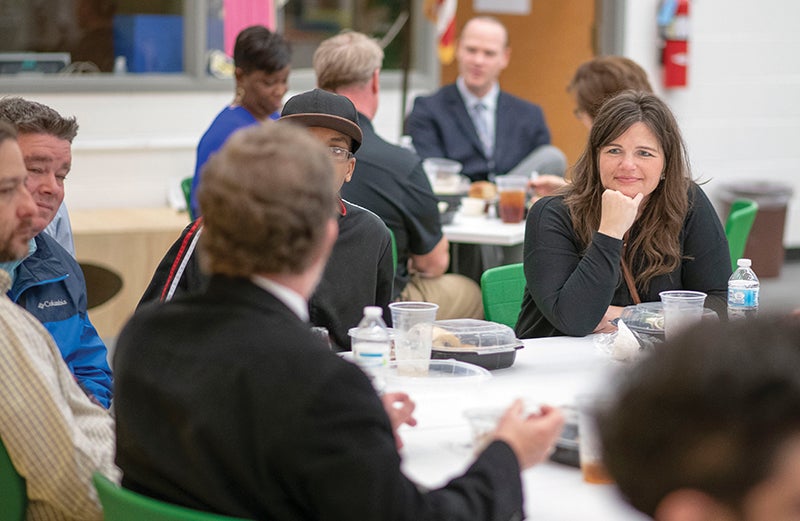Superintendent Lynn Moody will launch new RSS accountability model next week
Published 12:00 am Wednesday, January 29, 2020

- JON C. LAKEY/SALISBURY POST NC Senator Deanna Ballard (R-45) listens to Rep. Larry Pittman (R-83) speak as they join students for a lunch at North Rowan High school. Rowan Salisbury School officials gathered at North Rowan High on Friday to host a visit by the two legislators who were visiting Rowan-Salisbury schools district to learn about the progress of school renewal., Spencer, NC, 3/15/19
By Carl Blankenship
carl.blankenship@salisburypost.com
SALISBURY – Renewal has given Rowan-Salisbury schools district-wide freedoms enjoyed by charter schools, but poses a challenge to quantify student success.
The freedoms granted by the N.C. General Assembly allow freedom with curriculum and even some exemption to standardized testing. Traditional public schools are ranked based on test scores, but RSS said it required a new accountability model to fit its goals for renewal.
Next week, Superintendent Lynn Moody will deliver a “State of the District” address to kick off a hard launch of the new model.
RSS Chief Strategy Officer Andrew Smith gave a presentation at the Board of Education’s Monday night meeting about the state of the model.
RSS has focused on three areas with renewal: academic skills, unique life goals and interpersonal skills.
The original draft of how the district would account to the community was presented to the board in October. The latest version presented Monday evening has been paired down somewhat, and includes a few categories the district is working on implementing and some that are in the research stage.
The district anticipates reporting on identifying passions for elementary school students, creating personalized high school interest plans with middle school students, completing student reflection surveys and reporting on students who are enrolled, enlisted or employed when they graduate from high school. The reflection surveys were the only item listed in interpersonal skills.
Getting students enrolled, enlisted or employed by the time they graduate is a major part of renewal. The plan is to get letters of confirmation from employers, military branches or higher education institutions to see how many students have plans as they leave high school.
The issue of how exit surveys will be performed was one concern raised Monday, with board members asking how already busy faculty will make time to perform the surveys in addition to what the district has taken on with renewal programs.
Smith told the Post accounting for what students actions after high school will be included in an exit survey seniors already take. The survey will ask for a document to confirm what they are doing after high school.
The school is defining 32 hours at minimum wage as full time employment and 12 credit hours as a full-time student.
This is part of the district talking to high school guidance counselors about what their roles will look like in the future, and having conversations with students about opportunities instead of just focusing on college.
“The end goal is to produce students who are great citizens and productive for our community,” Smith said.
Smith gave an outline of how students will be guided as they progress through the district. In elementary school, kids do not make any decisions, he said. They have different experiences and see the job opportunities that match with their passions. The district wants to expand options for kids beyond stereotypical careers presented to kids, including being a doctor, nurse or firefighter.
In middle school, kids will start to narrow in on some of their interests. By the end of high school, they have focused in.
“The point is to get kids into the space where the natural gifts are there with their academic interests and their passion,” Smith said.



